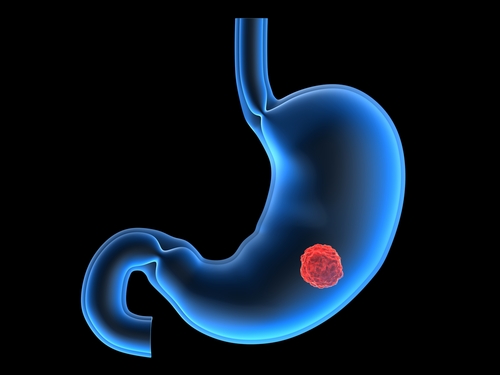Stomach Cancer
Definition of Stomach Cancer
Stomach is a muscular bag which is a part of our digestive system. The first resting place of the food we eat is the stomach. Cancer of this part of the alimentary canal (digestive system) is called stomach cancer or gastric cancer.
Cause of Stomach Cancer
Stomach cancer may occur due to a number of causes. A few are discussed below:
-
The infection of Helicobacter pylori (a bacteria) is notorious for causing stomach cancer. This bacteria is the cause of chronic inflammation of the inner lining of stomach. When stomach tries to repair the damage, this long term repairing gets faulty and leads to the formation of cancerous lesions.
-
Smokers and alcoholics are also at an increased risk of stomach cancer. Studies have shown that the risk of cancer increases from 40% in current smokers to about 80% in heavy smokers. Stomach cancer due to smoking mainly involves the upper part of the stomach (near esophagus).
-
Some foods have also proven to cause or lead to stomach cancer. These include smoked foods, salt-rich foods, red meat, processed meat, and pickled vegetables. This occurs because of the conversion of nitrates and nitrites from meat by certain bacteria into carcinogenic (cancer causing) compounds that target stomach.
-
Fresh fruits and vegetables, citrus fruits and antioxidants, on the other hand, have been found to decrease the risk of stomach cancer.
-
Estrogen may have a protective role against stomach cancer. This is because of the prevalence of stomach cancer more in the males than females.
-
There may also be a genetic predisposition to stomach cancer. Research has shown that a very small number of stomach cancers arise because of the inherited abnormality in CDH1 gene.
-
Other factors that may increase the risk of stomach cancer include AIDS, diabetes, chronic atrophic gastritis and pernicious anemia.
Signs and Symptoms of Stomach Cancer
Signs and symptoms of stomach cancer are not easy to find in the early stages of the disease and are divided into following three stages:
-
Stage 1 (early): There is abdominal discomfort, loss of appetite and heartburn (burning sensation.
-
Stage 2 (middle):There is weakness and fatigue. After meals there is swelling (bloating) of stomach.
-
Stage 3 (late): There is pain in the upper region of the abdomen, nausea and sometimes vomiting, either diarrhea or constipation, weight loss, bloody stools or blood in vomiting, and dysphagia (difficulty in swallowing).
Risk Factors for Stomach Cancer
Some of the factors that may increase the risk for development of stomach cancer include:
- Age over 55
- Autoimmune atrophic gastritis
- Intestinal metaplasia
- Male gender
- Ethnicity
- Smoking
- Genetic factors
- Eating smoked, salted, or pickled vegetables
- The bacterial infection Helicobacter pylori
H. pylori is a common, treatable infection which leads to stomach inflammation and may increase the risk of developing stomach cancer.
Diagnosis of Stomach Cancer
The diagnosis of stomach cancer relies on a good medical history, physical examination and laboratory testing. Some other examinations include:
-
Gastroscopic examination in which a fiber optic camera is inserted into the stomach through the mouth to visualize the stomach.
-
Computed tomography (CT scanning) is sometimes helpful in revealing gastric cancer.
-
Upper GI series (also known as barium roentgenogram).
After identifying the region or area of the stomach cancer using the above mentioned techniques, the tissue biopsy of that area is done. This tissue is then sent for further analysis. The histological examination of this tissue under the microscope then confirms the presence of cancer cells.
Gastric cancer manifests itself through a number of cutaneous (skin) conditions as well. Two conditions worth mentioning are darkening hyperplasia of skin and darkening of palms (known as triple palms).
Prevention from Stomach Cancer
- Do not smoke.
- Avoid alcohol consumption
- Eat a healthy foods rich in fruits and vegetables that contain antioxidant vitamins, such as A and C, and says that they lower the risk of stomach cancer, and a Mediterranean diet is associated with lower rates of stomach cancer
- Avoid salted, pickled, smoked foods
- Take medicines to treat reflux disease (heartburn), if you have it.
- Take antibiotics if you are diagnosed with H. pylori infection.
Treatment of Stomach Cancer
The cure of stomach cancer is difficult because most of its early signs are asymptomatic and the disease has usually advanced to a later stage when the diagnosis is made. There are a handful of treatment options for stomach cancer and are as follows:
-
Surgery
The most common treatment plan for stomach cancer is the surgical removal of the affected part and the associated lymph nodes. There may sometimes be the need to remove close by organs like part of the intestine or pancreas, depending upon the extent of invasion. The surgical intervention is curative in about 40% of the cases.
-
Chemotherapy
The use of chemotherapy for the treatment of stomach cancer has not been a great success. It has been used to reduce the size of the tumor prior to surgery, relieve symptoms and increase survival time. It has also been used after surgery to destroy the remaining cancer cells. Some of the drugs used are: 5-FU (fluorouracil), capecitabine, carmustine, semustine, doxorubicin and cisplatin.
-
Radiotherapy
Radiotherapy (radiation therapy) is the use of high energy rays to kill actively growing cells (cancer cells and other normal cells like hair cells) and stop their growth. It is used in combination with chemotherapy and surgery. Sometimes when surgery cannot be done, then it is used with radiotherapy to relieve the symptoms. It has been useful against pain and reducing the tumor size.

